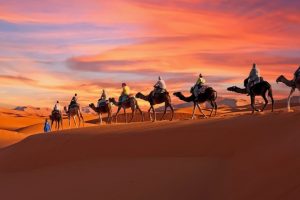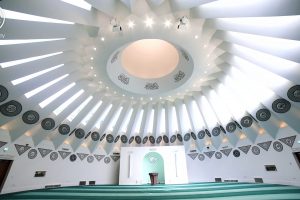
In the Mubarak Mosque in Islamabad, Tilford, His Holiness Hazrat Mirza Masroor Ahmad (aba) envisioned having the attributes of Allah on its walls so people could reflect deeper on God’s existence. His Holiness (aba) guided minutely on all aspects of design and implementation.
This series delves deeper into each of God’s attributes to gain a better understanding of His Being.
The calligraphy was designed by Razwan Baig, while The Review of Religions were given the opportunity to manage the project and produce each piece. Research for this series was compiled by Syed Mubashar Ayyaz (Research Cell) and translated into English by Shahzad Ahmed, Zafir Mahmood Malik and Nooruddeen Jahangeer Khan.

65 . The Provider [of the Means of Progress and Advancement] (Al-Muqaddim)
قَالَ لَا تَخۡتَصِمُواْ لَدَيَّ وَقَدۡ قَدَّمۡتُ إِلَيۡكُم بِٱلۡوَعِيدِ
‘God will say, “Quarrel not in My presence, I gave you the warning beforehand.”’ [1]
Among the number of meanings provided by the Arabic lexicon ‘Aqrab al-Mawarid that help us understand the root word, we read that قَدّمَ (qaddama) means that he gave precedence or placed someone ahead of others. Furthermore, when used in the context of an attribute of Allah, we find in the lexicon Al-Munjid:
المُقَدِّمُ:مِنْ اَسْمَائِ الله تَعَالٰی وَهوَ الَّذِی یُقَدِّمُ الْاَشْیَاءَ وَیَضَعُهَا فِی مَوَاضِعِهَا
That is to say, المُقَدِّمُ (al-Muqaddim) is an attribute of Allah Almighty, and He is the One Who puts everything in its proper place.
According to Lisan Al-‘Arab, another meaning of قَدّمَ (qaddama) is to be the very first.
The Holy Prophet (sa) taught a prayer in praise of God Almighty, which mentions this attribute of God:
‘O Allah! All praise belongs to You. The heavens and the earth and whatever is in them lies in Your divine control. All praise belongs to You; the heavens and the earth and whatever is in them is under Your divine sovereignty. All praise belongs to You; You are the light of the heavens and the earth, and all praise belongs to You. You are the King of the heavens and the earth and whatever lies in them, and all praise belongs to You. You are the Truth, Your promise is true, to meet You is true, Your word is true, paradise is true, hell is true, all the prophets are true, Muhammad (sa) is true, and the Day of Resurrection is true. O Allah! I submit before You; I believe in You and depend on You, and incline towards You, And with Your help I take on this task, and I take You as a judge (to decide between us). Grant me Your forgiveness for all my actions of the past and what is come in the future and whether they are those that I concealed or revealed. And You are the One Who postpones and the One Who provides the means for all advancement and progress. There is none worthy of worship except You.’ [2]
The Grand Status of God
Another meaning of qaddama is to be the very first. Whilst describing the grand status of God Almighty, the Promised Messiah (as) has stated:
‘He is the First and the Last; He is Manifest and He is Hidden. He is in the heavens, in other words He is far, and He is also on the earth, in other words He is near. “And when My servant asks you of Me, I am near, that is to say, for My friends I am close and for My enemies I am far.”’ [3]
ENDNOTES
- The Holy Qur’an, 50:29
- Sahih Bukhari, Kitabut-Tahajjud, Hadith No. 1120.
- Hazrat Mirza Ghulam Ahmad (sa) Sat Bachan, Ruhani Khaza’in, Vol.10 (Tilford, Surrey: Islam International Publications Ltd., 2008), 232.

66. The Postponer (Al-Mu’akhkhir)
وَلَئِنۡ أَخَّرۡنَا عَنۡهُمُ ٱلۡعَذَابَ إِلَىٰٓ أُمَّةٖ مَّعۡدُودَةٖ لَّيَقُولُنَّ مَا يَحۡبِسُهُۥٓۗ أَلَا يَوۡمَ يَأۡتِيهِمۡ لَيۡسَ مَصۡرُوفًا عَنۡهُمۡ وَحَاقَ بِهِم مَّا كَانُواْ بِهِۦ يَسۡتَهۡزِءُونَ
‘And if We put off their punishment until a reckoned time, they would certainly say, “What withholds it?” Now surely, on the day that it shall come unto them, it shall not be averted from them, and that which they used to mock at shall encompass them.’ [1]
According to the Arabic lexicon ‘Aqrab al-Mawarid, when used as an attribute of Allah, الـمُؤَخِّرُ (al-Mu’akhkhir) means: الَّذِی یُؤخِّرُ الْأَشْیَاءَ فَیَضَعُهَا فِی مَوِاضِعِهَا That is to say, the Being Who postpones things and places them in their appropriate places.
In one of the narrations, the Holy Prophet (sa) has used the attribute الـمُؤَخِّرُ (al-Mu’akhkhir) in one of his supplications. It is reported that towards the end of the formal prayer [Salat] the Holy Prophet (sa) would recite the following prayer:
‘O Allah, forgive me my sins past and present, what I have committed openly and in secret, and (forgive) me my transgressions, and of that which You know better than I. You are the One Who brings forward and the One Who postpones. There is none worthy of worship, except You.’ [2]
Can a Decree be Postponed?
The Promised Messiah (as) has mentioned the different types of decree and whether or not God Almighty’s attribute of الـمُؤَخِّرُ (al-Mu’akhkhir) can become operational. He states:
‘There are two kinds of decree: one may be referred to as suspended (mu’allaq) and the other is known as absolute (mubram). The operation of a suspended decree may be averted by the grace of Allah Almighty through prayer and almsgiving. An absolute decree, however, cannot be averted through prayer and almsgiving. However, nonetheless, these good deeds are not left useless, for this is contrary to the greatness of Allah Almighty. He returns the benefit of these prayers and alms by some other means. In some cases, God Almighty causes a delay in the operation of a decree or postpones it for some time.’ [3]
ENDNOTES
- The Holy Qur’an, 11:9.
- Sahih Muslim, Kitab Salatil Musafirin Wa Qasriha, Hadith No. 771a.
- Hazrat Mirza Ghulam Ahmad (as), Malfuzat – Volume 1 (Tilford, Surrey: Islam International Publications Ltd., 2018), 155.

67. The Great Sustainer (Ar-Razzāq)
إِنَّ ٱللَّهَ هُوَ ٱلرَّزَّاقُ ذُو ٱلۡقُوَّةِ ٱلۡمَتِينُ
‘Surely, it is Allah Himself Who is the Great Sustainer, the Lord of Power, the Strong.’ [1]
In the Arabic lexicon ‘Aqrab al-Mawarid it is stated that ٱلرَّازِقُ (ar-Rāziq) and ٱلرَّزَّاقُ (ar-Razzāq) are attributes of Allah Almighty for He alone provides for all of creation, and He alone is the One Who grants manifest and hidden provisions.
In a narration of the Holy Prophet (sa), God Almighty addresses His servants and explains the ways in which He provides for them, stating:
‘O My servants, I have forbidden injustice for Myself and have also made it forbidden for you, therefore do not commit injustices against one another. O My servants, all of you are astray except for those who I have guided, so seek guidance of Me and I shall guide you. O My servants, all of you are hungry except for those I have fed, so seek your means of sustenance of Me and I shall provide for you. O My servants, all of you are naked except for those who I have clothed, so seek clothing of Me and I shall clothe you. O My servants, you sin by night and by day, and I forgive all sins, so seek forgiveness of Me and I shall forgive you. O My servants, even if you wish to cause harm Me harm, you will not be able to do it, likewise, even if you wish to provide Me with benefit, you are incapable of doing so. O My servants, even if all those who have gone before you and all those to come after, and every single one amongst the Jinn and man were to become as the most righteous amongst you, it will make no difference to My sovereignty. O My servants, even if all those who have gone before you and all those to come after, and every single one amongst the Jinn and man were to become as most the evil person amongst you, it will make no difference to My sovereignty. O My servants, even if all those who have gone before you and all those to come after, and every single one amongst the Jinn and man were to gather in an open plain and ask of Me and I were to grant every single one of them all that they had asked for, it will not diminish even as much as the water taken out by a needle when dipped in the ocean. O My servants, it is but your deeds that I record for you and then recompense you for. So let him who finds good, praise Allah, and let him who finds other than that blame no one but himself.’ [2]
Two Kinds of Provisions
Whilst delving into the philosophy of the matter, the Promised Messiah (as) expounds upon the true purpose of provisions of the world and the way in which one should avail of them. He states:
‘The fact of the matter is that provisions are of two kinds. There is one form that serves as a trial and the other is by way of anointment. Provisions by way of trial are those which have no relation with Allah; in fact, such provision continues to move man away from God, until it destroys him completely. It is to this that Allah Almighty alludes in the following verse: لَا تُلۡهِكُمۡ أَمۡوَٰلُكُمۡ i.e. let not your wealth ruin you. Provision by way of anointment is that which is devoted to God. God becomes the Guardian of such people. Such individuals consider all their possessions to belong to God and they demonstrate this through their action. Consider the state of the companions—when faced with trying times, they sacrificed whatever they had in the way of Allah Almighty. Hazrat Abu Bakr Siddiq (ra) was the first to don the garb of poverty. But how did Allah the Exalted reward him for this? It was he who became the very first Caliph. Therefore, in order to be blessed with true merit, goodness and spiritual pleasure, only that wealth can be of use which is spent in the way of God.’ [3]
ENDNOTES
- The Holy Qur’an, 51:59.
- Sahih Muslim, Kitabul Birri wa al-Silati wa al-Adab, Bab Tahrim al-Zulm, Hadith No. 6467.
- Hazrat Mirza Ghulam Ahmadas, Malfuzat – Volume 1 (Tilford, Surrey: Islam International Publications Ltd., 2018), 218.

68. The First (Al-Awwal)
هُوَ ٱلۡأَوَّلُ وَٱلۡأٓخِرُ وَٱلظَّـٰهِرُ وَٱلۡبَاطِنُۖ وَهُوَ بِكُلِّ شَيۡءٍ عَلِيمٌ
‘He is the First and the Last, and the Manifest and the Hidden, and He knows all things full well.’ [1]
الأَوَّلُ (al-Awwal), according to the Arabic Lexicon al-Munjid, means قَبْلَ کُلِّ شَئٍ i.e., the one that comes before all else. Similarly, it means بادِئَ ذِی بَدْءٍ i.e., the very first.
Whilst describing how there was nothing but God Almighty before the creation, the Holy Prophet (sa)sa once stated:
‘God existed and nothing else existed. His throne was on water. Then, He created heavens and earth and wrote everything in the Qur’an.’ [2]
Allah – the First and the Last
The Promised Messiah (as) has beautifully described certain attributes of God Almighty, stating:
‘God is One, Who has no partner. He alone is the God in the heavens and He alone is the God on the earth. He is the First and He is the Last, and He is the Manifest and He is the Hidden. Eyes cannot perceive His reality but He knows the reality of the eyes. He is the Creator of everything and nothing is like unto Him.’ [3]
ENDNOTES
- The Holy Qur’an, 57:4.
- Sahih Bukhari, Kitab Bad-il-Khalq, Hadith No. 3191.
- Hazrat Mirza Ghulam Ahmad (as), Barahin-e-Ahmadiyya – Part IV (Tilford, Surrey:
Islam International Publications Ltd., 2016), 326.

69. The Last (Al-Ākhir)
هُوَ ٱلۡأَوَّلُ وَٱلۡأٓخِرُ وَٱلظَّـٰهِرُ وَٱلۡبَاطِنُۖ وَهُوَ بِكُلِّ شَيۡءٍ عَلِيمٌ
‘He is the First and the Last, and the Manifest and the Hidden, and He knows all things full well.’ [1]
الآخِرُ (al-Ākhir) i.e. the last, is the opposite of الأَوَّلُ(al-Awwal) i.e. the first. It is used to describe that which comes after a certain thing, but nothing follows it. Hence, it is evident that it is the final and ultimate link of a chain. [2]
The Holy Prophet (sa) has mentioned this attribute of God Almighty in one of his supplications. Hazrat Fatimah once requested for a maid to assist in her household chores, and the Holy Prophet (sa) said that he was unable to fulfil this particular wish of hers upon which she returned. Later, the Holy Prophet (sa) visited her house and said, ‘Shall I inform you of that which even greater than what you asked of.’ Upon enquiring what it was, The Holy Prophet (sa) taught the following prayer:
‘O Allah, Lord of the seven heavens and Lord of the mighty throne, our Lord, and the Lord of everything, Revealer of the Torah, the Gospels and the Magnificent Qur’an, You are the First and there is nothing before You. You are the Last and there is nothing after You. You are the Manifest, and there is nothing above You. You are the Most Hidden and beside You there is nothing. Settle our debts and save us from poverty and make us self-sufficient.’ [3]
The Everlasting God
Where the Promised Messiah (as) describes God Almighty’s omnipresence, he also mentions His quality of preceding all of creation and His presence after it. He states:
‘God Almighty is the very First; and despite being the First, He is also the very Last. He is the Most Manifest; and despite being the Most Manifest, He is also the Most Hidden. Then God Almighty has said, “Allah is the Light of the heavens and the earth.” His light is present in all things, be they in the heaven or the earth.’ [4]
ENDNOTES
- The Holy Qur’an, 57:4.
- Lughat-ul-Qur’an, Vol. 1, p. 208
- Sunan Ibn Majah, Kitab ad-Dua, Hadith No. 3831.
- Hazrat Mirza Ghulam Ahmad (as), Chashma-e-Ma’rifat, Ruhani Khaza’in, Vol. 23 (Tilford, Surrey: Islam International Publications Ltd., 2008) 119-120.




Add Comment